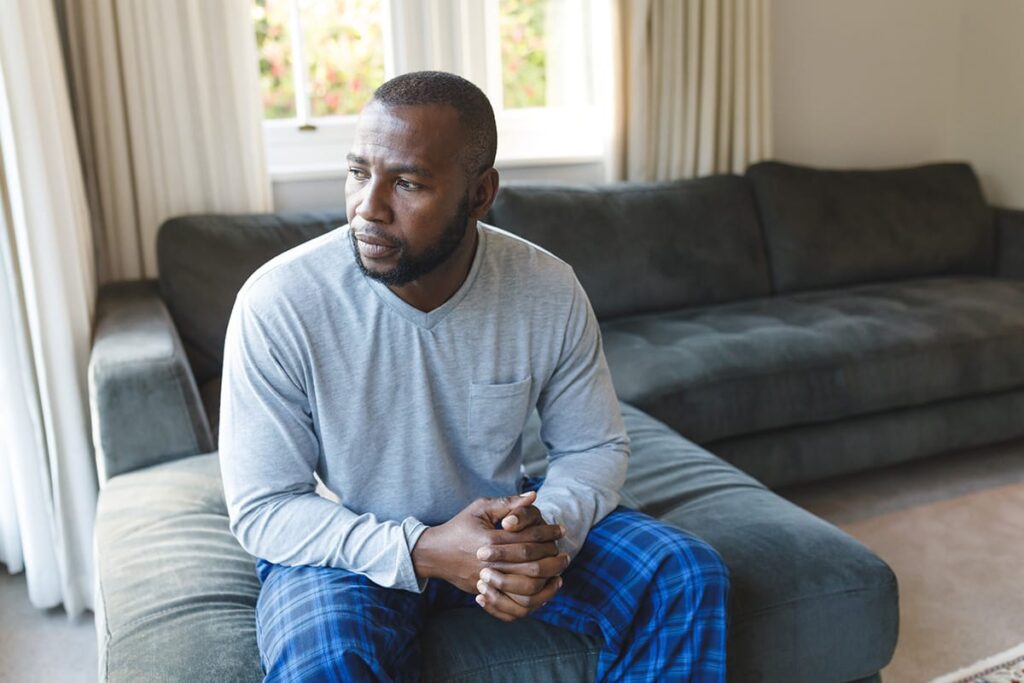Living with anxiety can be an overwhelming experience. It’s a condition that affects millions of people worldwide and often goes undiagnosed. Unfortunately, many people living with symptoms of anxiety turn to unhealthy habits, like drug and alcohol abuse. This can make the condition worse and lead to a vicious cycle of self-medication.
BlueCrest Health Group in New Jersey offers support for individuals struggling with anxiety and co-occurring substance use issues. Our team of trained professionals understands the complexities of anxiety and how it can impact a person’s life. We provide personalized treatment plans that address the root causes of anxiety and teach healthy coping mechanisms. Enroll in an anxiety treatment program in NJ today by calling 888.340.2214.
When Anxiety Becomes a Problem: Understanding Co-Occurring Substance Use
Anxiety, like any other emotion, is a normal part of life. However, when it becomes constant and overwhelming, it may signal an anxiety disorder. One significant aspect of anxiety disorders is their tendency to co-occur with substance use. This means that individuals dealing with high levels of anxiety often turn to alcohol, drugs, or other substances as a way to self-medicate or cope with their symptoms.
While this might provide temporary relief, it can lead to a cycle of dependence, exacerbating both the anxiety and the substance use disorder. It’s important to understand that if you or a loved one are experiencing this, you’re not alone. Many people face this challenge, and help is available—the first step is to recognize the signs.
Common Signs of Anxiety You Can Notice
Recognizing the signs of anxiety is the first step toward seeking help. Some common signs include:
- Persistent worry or fear about everyday situations
- Feeling restless or on edge
- Difficulty concentrating or mind going blank
- Irritability
- Trouble falling asleep or staying asleep
These signs can be quite noticeable and may interfere significantly with a person’s daily life, but some signs may not be so easy to understand.
Anxiety Symptoms that Are Difficult to Spot
While some symptoms of anxiety are easier to identify, others may be more subtle or difficult to connect with anxious feelings. These can include:
- Physical symptoms like headaches, stomachaches, or unexplained aches and pains
- Changes in eating habits, either eating too much or too little
- Avoiding social situations or places due to fear or discomfort
- Procrastination or avoidance of tasks due to feeling overwhelmed
- Overthinking or obsessing over small details
These signs may not be immediately associated with anxiety but are crucial to notice as they can indicate an underlying issue.
When Signs of Anxiety Show the Need for Treatment
If you or a loved one are experiencing these signs of anxiety, especially if they’re persistent or worsening over time, it may be time to seek professional help. This is particularly true if these symptoms are accompanied by substance use.
Treatment for co-occurring disorders typically involves addressing both the anxiety and the substance use simultaneously. This can involve therapy, medication, support groups, and lifestyle changes. Remember, it’s never too late to seek help, and recovery is always possible.
Call BlueCrest Health Group to Find Relief Now
At BlueCrest Health Group in New Jersey, we understand the challenges of living with anxiety and co-occurring substance use. Our evidence-based treatment programs are designed to address each individual’s unique needs and provide them with the tools for lasting recovery.
Don’t let anxiety control your life any longer. Contact us online today or at 888.340.2214 to enroll in one of our anxiety treatment programs and take the first step toward a healthier, happier life. Remember, you are not alone, and there is always hope for a brighter future.

